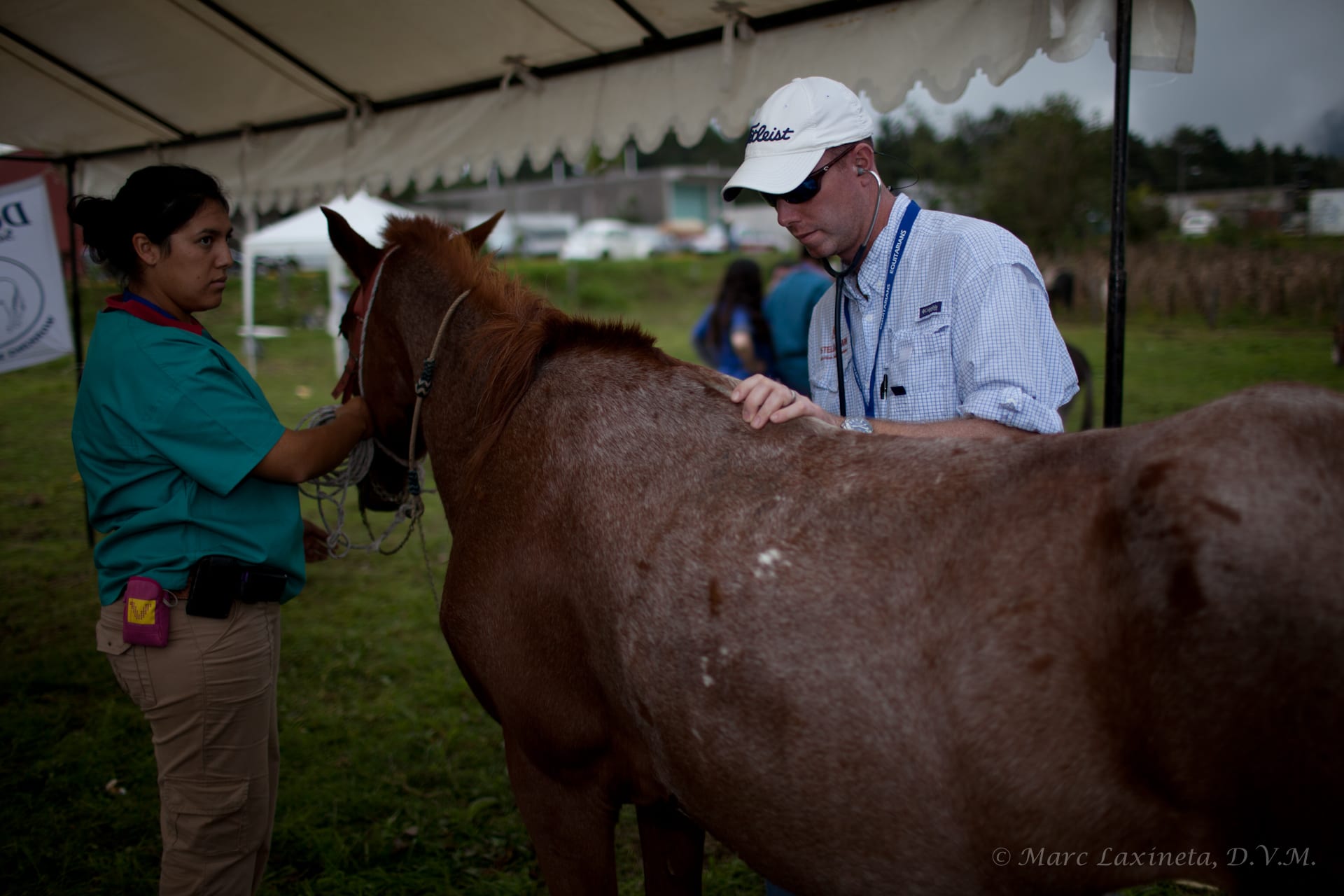Weatherford, Texas –The scene was nearly heartbreaking. A bedraggled burro gamely carried his passenger, an amputee, into the makeshift veterinary clinic. Dismounting with his crutches, the Mexican man looked to veterinarians Rob Franklin and Keith Latson for help.
“The burro had a huge saddle sore on his back and was clearly undernourished,” said Latson, an orthopedic surgeon practicing in California. “For this man, the burro was more to him than the burros and horses we see in the U.S. This burro was his transportation and provided a way for him to make a living for his family.”
In the United States, horses, once numbering in the hundreds of millions, served many purposes, including farming, transportation and bearing burdens. But now, horses are a source of pleasure for many as they are used to ride along trails, be displayed in shows or are, for some, simply pets. So, it’s hard to imagine the suffering many endure as beasts of burden in countries around the world, but it is not hard to imagine how we can help.
Over a period of four days, Latson and Franklin, who practices internal medicine in Weatherford, Texas, treated more than 1,600 equids in Mexico for a variety of ailments, and provided basic services, such as floating, or filing, the sharp points of teeth, and deworming to rid the animals of potentially fatal parasites.
That experience in October 2011, an “equitarian” mission sponsored by the American Association of Equine Practitioners, proved to be a bit of an epiphany for the two former Texas A&M University roommates and fraternity brothers. Already working together to produce a superior probiotic product, the pair realized that by providing such a product to underdeveloped regions dependent on burros and horses, the people would be better able to care for their animals and families. The question then became, “what to do about it?”
The answer: Full Bucket.
Full Bucket Probiotic is the first in what will become a full line of products developed by the veterinarians to not only provide a superior quality product to horses and other equids in the United States, but to underdeveloped countries, as well.
With the purchase of one Full Bucket in the United States, another Full Bucket will be provided at no charge to treat horses and donkeys in these regions through the company’s Care+Care program.
While probiotics for both humans and animals have been on the market for years, many horse owners aren’t aware of the value of the product in their animals as part of a health care maintenance program. Plus the word “probiotic” isn’t necessarily well understood nor is why it’s needed.
“Basically, not all feed is created equal,” said Latson, “and a probiotic helps with nutritional balance.” Probiotics, live microorganisms, are thought to beneficially affect the host by improving its intestinal microbial balance. For humans, probiotics are often marketed in yogurts and dietary supplements. In horses, they come labeled as a nutritional supplement and the formulas vary – a fact Latson and Franklin discovered while treating animals after surgery.
“Keith and I got really frustrated with the way our patients were responding to surgery and the problems some were having with gut issues and diarrhea,” said Franklin. “I recommended a formulation of probiotic that was doing well in humans and with some modification would do well in horses. For the most part, the problem was solved and we began working on developing a more effective model for horses.”
Working with a formulator, the pair captured what they believed to be the most effective formulation and began to share with their fellow veterinarians, who responded with “overt” excitement.
“Once the formula got out there, other veterinarians began to tell us this was exactly what they had been looking for and it has become their ‘go to’ product,” said Franklin. “Veterinarians have since discovered that if they have a horse on an antibiotic, that horse needs to be a probiotic.”
Premier veterinary practices, including Rood and Riddle Equine in Lexington, Ky., Littleton Equine Medical Center in Littleton, Colo., and Mid Atlantic Equine Veterinary Center in Ringoes, New Jersey, have consistently relied on Full Bucket.
Full Bucket Probiotic is not only for the high-level performance horse, but is effective for all classes of horses.
“Horses are exquisitely sensitive to stress,” said Latson, “and that stress can come from being hauled for an extended period of time to changing pastures with more aggressive horses in the mix.”
As the Full Bucket line of products expands, Latson and Franklin intend to continue providing assistance to underdeveloped countries through the Care+Care program. Having witnessed the conditions in which these animals exist, they believe they can serve the dual purpose of helping animals and horses even more effectively.
“Right now our priority is to invest back into the Care+Care program first, then into the product and lastly ourselves,” said Latson. “We hope this program will encourage people to get engaged and will help them satisfy their inspiration to help animals.”
————
FullBucket provides a complete line of animal care products focusing on nutritional health. Developed by Rob Franklin, DVM, Dip. ACVIM and Keith Latson, DVM, Dip. ACVS, FullBucket is the leading probiotic in the world and created Care+Care to assist animal health care providers and owners in underdeveloped countries by providing high-quality and scientifically proven nutritional supplements at no cost. To purchase FullBucket products, contact your MWI Veterinary Supply representative or go to www.mwivet.com.









